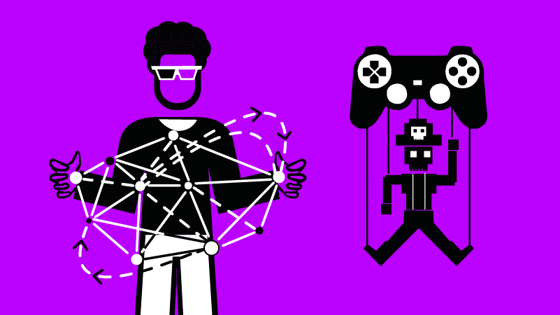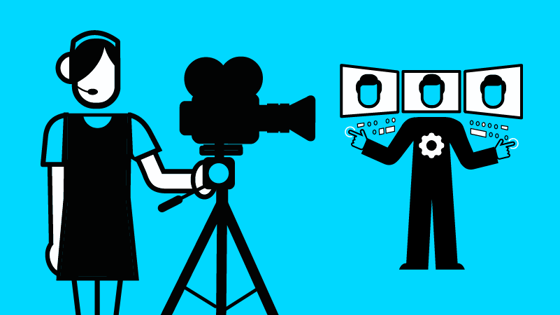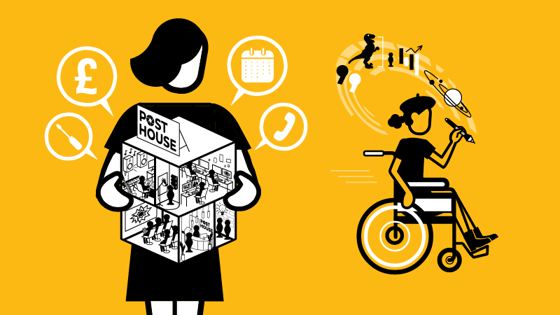Broadcast engineering
Wireperson

What does a wireperson do?
A wireperson follows instructions given to them by a technician or a broadcast engineer about how to connect wires between many different pieces of equipment. They might work on a large project connecting thousands of metres of cable to build a new multi-studio centre like BBC Cardiff or at an overseas location to create the next Olympic media village. Not all projects are big, but the same level of attention to detail and self-discipline are needed for modest-sized projects such as a single video edit suite.
A wireperson has good technical skills, as they perform tasks requiring great patience and precision, like soldering and wiring electrical connectors for video and audio cables. They also handle specialised gear and know which cables are which; for example, whether they are audio, video, data or radio frequency. They must be able to work quickly and accurately and understand how to test their work as they go along. Sometimes there’s a lot of pressure from deadlines, so a wireperson should be prepared to work long hours if a project is delayed.
Sometimes a wireperson is based in a workshop, fixing equipment; sometimes they work on site on a project in the UK or abroad. Some workplaces are relatively comfortable, in buildings with good facilities and places to eat, but others are quite uncomfortable: they might be outside in the cold or in a noisy environment.
A wireperson is usually part of the team that starts on a new project, so they often work with builders. On sites where there’s a lot of building work going on, a wireperson needs to understand how to work safely. When installing cables, sometimes they need to work up high, several storeys above ground level, or they need to pull cables through pipes that run under floors.
A good wireperson is sought after and often works on a freelance basis for a number of different companies. Big events such as the Olympics and the FIFA World Cup offer a lot of exciting work opportunities for an experienced wireperson.
Watch and read
- Working in broadcast media technology panel hosted by RISE – Women in Broadcast
- Day in the life – Peter Ritch, senior broadcast wireman at dB Broadcast
What’s a wireperson good at?
- Wiring: having expertise in soldering and handling cables
- Changing workplace: being comfortable with ever-changing places of work
- Safety: knowing how to make sure that safe working conditions are always maintained
- Accuracy: Working precisely, without losing concentration, on a detailed task that might take a long time.
Who does a wireperson work with?
The technical project manager and the design engineers in the installation team. They also work with broadcast technicians and broadcast engineers.
How do I become a wireperson?
You need a good level of knowledge of handling live wires and electrical equipment. A degree in electrical engineering or broadcast engineering isn’t necessary, but it would help. Many people get into the field through apprenticeships or work experience.
At school or college
If you’re interested in a career in broadcast engineering, A-levels in maths, computer science and physics would be good to get under your belt. You could combine these with subjects from the arts and humanities, such as English, history or music, which may come in useful for the content of the programmes you work with. Languages are also handy if you need to travel or want to work with foreign broadcasters – studying A-level Spanish might be your ticket to working at the 2026 World Cup in Mexico!
The following Level 3 vocational qualifications are also relevant to this role:
- BTEC in Engineering with Engineering Maths
- Cambridge Technical Extended Certificate in Engineering
- BTEC National Foundation Diploma in Engineering
- C&G Technical Certificate in Engineering
- EAL Technical Diploma/Extended Diploma in Engineering Technologies
- BTEC Diploma/Extended Diploma in Electrical and Electronic Engineering
- City & Guilds Advanced Technical Diploma in Electrical Installation
- EAL Diploma/Advanced Diploma in Electrical Installation
Selected schools and colleges have also started offering T-levels – a qualification equivalent to three A-levels that is designed to help you get into the industry of your choice. Study is 80% classroom- and 20% work placement-based.
The following T-levels would help to kick-start your career in broadcast engineering:
- Media, Broadcast and Production
- Digital Production, Design and Development
- Digital Support Services
- Digital Business Services
- Design and Development for Engineering and Manufacturing
- Maintenance, Installation and Repair for Engineering and Manufacturing
- Engineering, Manufacturing, Processing and Control
Apprenticeships
Apprenticeships are jobs with training. Search for apprenticeships in broadcast engineering with broadcasters like BBC and Sky. Go to What’s an apprenticeship? to find out more and Where can I find an apprenticeship? to find apprenticeships in your region. Alternatively, you can approach companies directly. Take a look at our list of apprenticeships to find the schemes of the main broadcasters. The BBC has a three-year apprenticeship in broadcast engineering that offers experience in all the areas a technical manager must master. You might want to start your career with a digital and technology solutions professional apprenticeship or a software engineering apprenticeship.
Volunteer
Get involved with events in your local community, whether that’s running the sound for your school talent show, managing the special effects for an amateur dramatics society or helping out at a volunteer-run radio station.
Contact theatre productions or local music venues that can get you behind the scenes of a production environment. Anything that gives you experience in dealing with equipment in a live environment will be helpful. Voluntary experience is great for your CV, because it shows you’re enthusiastic, have technical ability and experience and you work well as part of a team.
Get a degree
A degree in a maths or science subject would stand you in good stead for entering the world of broadcast engineering. You could also look at electronic engineering, software design or computing. Go to ScreenSkills Select to find university and college courses accredited by ScreenSkills.
Look outside the industry
If you can’t or don’t want to get into broadcast engineering straightaway, industries that require similar skills include telecoms, live events and radio. These would enable you to strengthen your technical abilities and get experience with technical equipment.
Get work experience
Write to local production companies and ask if they offer technical assistant roles. Keep an eye out for work experience opportunities at the BBC, ITV, Channel 4, Sky and the PACT Indie Diversity Training Scheme.
Alternatively, try approaching a rental equipment company that supplies productions with the gear they need. This will enable you to get your hands on equipment, learn more about it and get to know people who work in TV.
Take a short course
If you are over 18, make a ScreenSkills account and check out ScreenSkills’ Training and opportunities page and click on Training to see what courses are available, whether they are in person or online. The training doesn’t have to be linked directly to broadcast engineering; for example, a short course on developing resilience would help you understand how to thrive in challenging circumstances.
Network
Get to know people in the film and TV industry by attending events such as ScreenSkills’ Open Doors. Go to Training and opportunities and use the events filter to find out what’s on. Meet professionals and ask them questions about their work, while demonstrating interest in and knowledge of the industry. Offer to provide them with your professional contact details and try to stay in touch with them. Go to Network well to learn how to do this.
Network online
Create a LinkedIn profile. See if there are Facebook pages or other social media groups for people making film and TV in your area. Create a ScreenSkills profile. There are a lot of crewing agencies that will charge you to be on their books. Sign up to the free ones initially. Wales Screen, Northern Ireland Screen and Filming in England offer free crew databases and opportunities to network in person. Find a film office near you and get connected. If you do sign up to paid sites, make sure they specialise in the areas in which you’re interested.
Search for jobs
Search for jobs on the broadcasters’ websites as well as on LinkedIn and other job-hunting websites. Make use of the ScreenSkills jobs board. You can also send a short speculative letter with your CV to technical managers or vision supervisors
You might also be interested in..
For other roles in the installation department, take a look at the trainee technical project manager.
Further resources
- BritishFilm Commission list of UK studios
- Engineering Council
- Rise: Women in Broadcast
- The Institution of Engineering and Technology
- The International Trade Association for the Broadcast & Media Industry
- Society of Media Professionals, Technologists and Engineers
- International Broadcasting Convention
- The Media Production & Technology Show
- E&T (Engineering & Technology) magazine
- NEP UK and Ireland
- Broadcast – Tech Talks
- Broadcast Buddy TV YouTube channel
- BBC Research and Development
- BBC Academy
- ITV Entry Careers
- Sky early careers
- 4Skills (Channel 4)
- Bectu (the media and entertainment union)
- Bectu Ratecards







